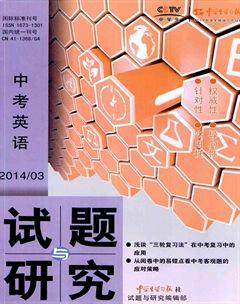“挑人拣物”的ed和ing形容词
朱桂云
中考英语试题中,辨别ed形容词和ing形容词用法的考点年年都出现。由于这类词的词义极为相近,因此使用时易混淆。下面结合近几年中考单项选择题中出现的这类试题谈谈这两种形容词的用法区别。
英语中,表示“感觉状况”方面的形容词有ed和ing两种形式。ed形式的形容词主要针对“人”,ing形式的形容词则主要针对“事物”。最常用的这类形容词有:interested(感兴趣的),interesting(有趣的);excited(激动的),exciting(令人激动的);annoyed(恼怒的),annoying(令人恼怒的);amazed(惊异的),amazing(令人惊异的、神奇的、迷人的);surprised(惊奇的),surprising(令人惊奇的);moved(感动的),moving(令人感动的);disappointed(失望的),disappointing(令人失望的);tired(疲倦的),tiring(令人疲倦的);bored(感到厌烦的),boring(令人厌烦的);delighted(高兴的),delighting(令人高兴的);pleased(高兴的、满意的),pleasing(令人高兴的、令人满意的);puzzled(感到迷惑的),puzzling(令人迷惑的);frightened(感到害怕的),frightening(令人害怕的);shocked(感到震惊的),shocking(令人震惊的)。我们可以用下面的顺口溜巧记两者的用法区别:
人前人后用ed,物前物后用ing。
★ 所谓“人前人后用ed”,指的是ed形式的形容词常用作“人”前的定语和“人”后的表语。例如:
The puzzled mother asked me why her daughter always had so many questions to ask.那个迷惑不解的母亲问我,为什么她女儿总是有那么多的问题要问。(puzzled在mother前作定语)
Mr. White was quite puzzled about what to do next. 怀特先生对下一步该怎么做感到非常困惑。(puzzled在Mr. White后作表语)
The excited people had already left when I got there.当我到达那儿的时候,那些激动的人们已经离开。(excited在people前作定语)
All of them were very surprised to see that her name headed the list.他们看到她的名字居第一位,全都感到非常惊奇。(surprised在All of them后作表语)
除“人”之外,也可以用ed形式的形容词来表示“飞禽走兽”的情感。例如:
The small fox was frightened and ran into the deep forest. 那只小狐狸受到惊吓,跑进了深山老林。(frightened在The small fox后作表语)
The frightened bird had no choice but to fly into the dark cave. 那只受到惊吓的鸟儿别无他法,只好飞进了漆黑的山洞。(frightened在bird前作定语)
★ 所谓“物前物后用ing”,指的是ing形式的形容词用作“事、物”前的定语和“事、物”后的表语或宾语补足语。例如:
This disappointing situation may finally reach a turning point.这种令人失望的状况最终可能达到一个转折点。(disappointing作situation的定语)
The teams performance the day before yesterday was disappointing. 前天这个队的表现令人失望。(disappointing在The teams performance后作表语)
We were very excited to hear the exciting news.听到那个激动人心的消息,我们感到非常兴奋。(exciting作news的定语)
He recognized her voice immediately and that was not surprising.他立即听出了她的声音,这也并不奇怪。(surprising在that后作表语)
She thought the report very interesting, but most of us didnt. 她认为这个报告很有趣,可我们大多数人都不这么认为。(interesting在thought the report后作宾语补足语)
请看下面的中考题及解析:
1.(2013年雅安卷)Its reallythat a tortoise can150 years old.
A. amazed; live to
B. amazed; live up to
C. amazing; live up
D. amazing; live to
2.(2013年烟台卷)Whatnews it is! Nobodyit.
A. a surprising; believes
B. surprising; believes
C. a surprised; believe
D. surprised; believe
3.(2012年达州卷)—Peter has changed a lot, hasnt he?
—Yes. He used tothe guitar, but now he is morein playing soccer.
A. plays; interested
B. play; interested
C. play; interesting
D. playing; interest
4.(2011年福州卷)—We all like Miss Wang.
—I agree with you. She always makes her English classes .
A. interestedB. interest
C. interesting
5.(2011年烟台卷)When I was walking past the window, I noticed Wang Feimy homework. I really got .
A. copying; annoyed
B. copying; annoying
C. copy; annoyed
D. copied; annoyed
第1题答案D。主语是It,因此要用ing形式的形容词作表语。句意是:乌龟能活到150岁,真是令人惊异。
第2题答案B。news属表示事物的名词,因此要用ing形式的形容词作定语。句意是:多么令人惊讶的消息啊!没人相信它。
第3题答案B。主语是he,因此要用ed形式的形容词作表语。句意是:过去他常弹吉他,可现在他对踢足球更感兴趣。
第4题答案C。宾语是表示“事物”的her English classes,因此后面的宾语补足语要用ing形式的形容词。句意是:我同意你的看法。她总是把她的课上得令人感兴趣。
第5题答案A。主语是I,因此要用ed形式的形容词作表语。句意是:当我从窗边走过的时候,我看到他正在抄我的作业。我真的感到很气愤。
从上面的例句及中考题解析可以看出,ed形式的形容词和ing形式的形容词存在“挑人拣物”的现象。不过,我们也需注意下面这个例外现象:
如果是主语本人的“表情、声音”等,依然用ed作定语。例如:
She listened with a puzzled expression on her face. 她脸上带着困惑的表情在倾听着。(a puzzled expression是主语She本人的表情)
He answered the phone in a tired voice. 他以疲惫的声音接电话。(a tired voice是主语He本人的声音)
特别提醒:用错ed和ing形式有时会闹出笑话。例如:
如果想表达“我受到感动”,就应该说“I was moved.”但如果说“I was moving.”那意思就是“我是动人的”!
用法拓展:如果ed或ing形式的词不是表示“感觉状况”方面的形容词,则要根据“ed是过去分词,ing是现在分词”的用法予以区别。通常情况下,过去分词表被动,现在分词表主动。例如:
1.(2013年安顺卷)He often drinks two cups ofwater when he comes back.
A. boilingB. boil
C. boiledD. boils
2.(2013年绥化卷)He wants to have his TV .
A. repairingB. repaired
C. to repair
3.(2011年潍坊卷)The new treatmentsby Norman Bethune helped a number of soldiers.
A. inventB. invents
C. inventingD. invented
第1题答案C。boiled water意思是已经烧开的水,而boiling water意思是沸腾的水。根据生活常识,我们喝的是已经烧开的水,因此选择C项。句意是:他回来后经常喝两杯开水。
第2题答案B。电视机是“被修理”,have sth. done表示“让某事被……、某物遭受……”,因此应选repaired。句意是:他让别人帮他修理电视机。
第3题答案D。invented by Norman Bethune属过去分词短语作treatments的后置定语。句意是:诺尔曼·白求恩发明的治疗方法帮助了许多士兵。
跟踪训练
根据每题汉语意思,用括号内所给单词的适当形式填空。
1.因为物理很有趣,所以我对它很感兴趣。(interest)
Im veryin physics because its very .
2.当他听到令人沮丧的考试结果时,他感到非常失望。(disappoint)
When he heard theresult of the exam, he was very .
3.有些人说印度电影令人厌烦,而另外一些人说它们好极了。(bore)
Some people say Indian films , but others say theyre great.
4.听到这令人高兴的消息,我们大家都高兴得跳了起来。(please)
All of us jumped with joy at thenews.
5.玛丽收到这样的一封信,将会怎样高兴啊!(delight)
HowMary will be to receive such a letter!
6.年轻人喜欢某些激动人心的比赛。(excite)
Young people are fond of somegames.
7.进入餐馆时,我们惊奇地发现里面全坐满了。(surprise)
When we entered the restaurant, we wereto find it completely full.
8.在那次长途旅行中,那位老人感到非常疲倦。(tire)
The old man was veryduring the long journey.
9.主考人对我的表演一定感到很满意。(please)
The examiner must have beenwith my performance.
10.老师给我们解释了那道令人迷惑的难题。(puzzle)
The teacher explained to us theproblem.
11.你每天做同样的事情感到厌烦吗?(bore)
Do you getdoing the same job every day?
12.所有在场的人都被他那动人的故事感动了。(move)
All the people present were greatlyby hisstory.
13.那边操场传来的噪音真令人讨厌。(annoy)
The noise from the playground over there is very .
14.你最可怕的经历是什么?(frighten)
What is the mostexperience you have had?
15. 听到我的启蒙老师去世的消息,我感到十分震惊。(shock)
I wasat the news of my first teachers death.
16.田野里的景色真迷人,不是吗?(amaze)
The sight in the fields is , isnt it?
17.我是如此的兴奋以致忘记了当时已经是午夜了。(excite)
I was sothat I forgot it was midnight.
18.一天,玛丽从她的医生那里得到了一些令人震惊的消息。(shock)
One day Mary received somenews from her doctor.
19.因为我粗心大意,他已开始恼火了。(annoy)
He was beginning to getwith me about my carelessness.
20. 米丽亚姆太害怕了,不敢告诉家人发生了什么事。(frighten)
Miriam was tooto tell her family what had happened.
21.我从未听到别人在背后说你的坏话。(say)
I have never heard anythingagainst you behind your back.
22.昨天你为什么把你的朋友留在那里等了那么长时间?(wait)
Why did you leave your friendthere for so long a time yesterday?
23.以前我从未见过这个单词用于这样的句子中。(use)
I have never seen the wordin such a sentence like this before.
24.刚才你注意到有人进入实验室了吗?(enter)
Did you notice anyonethe lab just now?
25.看见那位老大爷躺在地板上时,他走过去把他扶了起来。(lie)
When he saw the old manon the floor, he went over and helped him to stand up.
26.那个小女孩看见有人从邻居家搬走了一台电视机。(carry)
The little girl watched a TV setout of her neighbors house.
27.自称是志愿者的那些年轻人来自我们大学。(call)
The young menthemselves volunteers come from our university.
28. 我的自行车坏了,我准备今天下午找人修一修。(fix)
Something is wrong with my bike. Im going to have itthis afternoon.
29.站在树下的那个男孩是约翰的弟弟。(stand)
The boyunder the tree is Johns younger brother.
30. 我母亲昨天买了一台新洗衣机。(wash)
My mother bought a newmachine yesterday.
参考答案
1.interested; interesting2. disappointing; disappointed3. boring4. pleasing5. delighted6. exciting7. surprised8. tired9. pleased10. puzzling11. bored12. moved; moving13. annoying14. frightening15. shocked16. amazing17. excited18. shocking19. annoyed20. frightened21. said22. waiting23. used24. entering25. lying26. carried27. calling28. fixed29. standing30. washing

